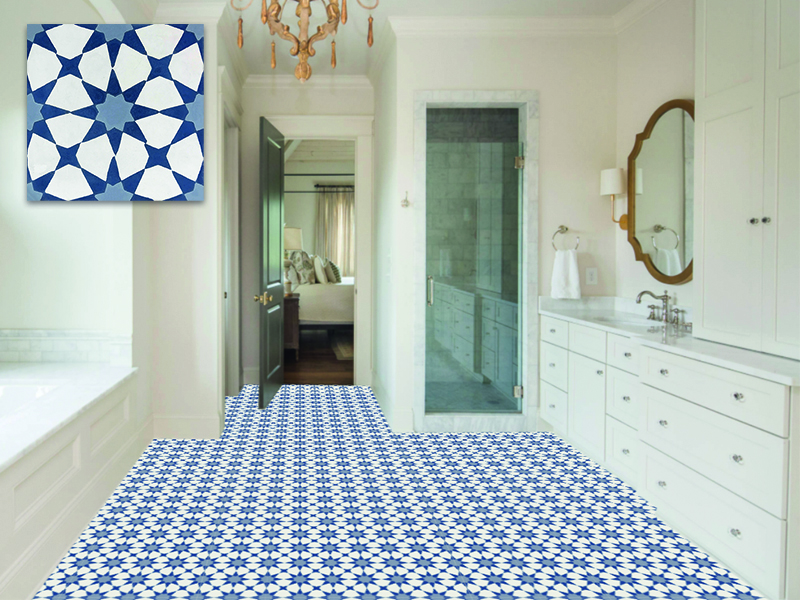Moroccan Magic: Designing with Moroccan Cement Tiles
Discover the Timeless Allure of Moroccan Tiles
What if one design detail could instantly infuse a space with rich history, vibrant artistry, and a globally inspired aesthetic? Enter Moroccan cement tiles—patterned masterpieces that bring tradition and charm to contemporary interiors. Whether you’re remodeling a kitchen or designing a boutique hotel, Moroccan tiles offer a unique blend of beauty, durability, and design flexibility.

What Are Cement Tiles?
Cement tiles—also known as encaustic tiles—are handcrafted decorative tiles made from a mix of natural pigments, marble powder, cement, and sand. Unlike ceramic tiles, the color and pattern are pressed into the surface, not glazed on top. This process creates a durable, matte finish that’s slip-resistant and long-lasting.
Studio Cement Tile offers hundreds of in-stock designs as well as custom options that reproduce any pattern or palette you can imagine.
Why Moroccan Tiles Are So Popular
Moroccan cement tiles are especially beloved for their:
- Intricate Geometric Patterns: Inspired by centuries of Islamic art.
- Bold Color Palettes: Turquoise, ochre, cobalt blue, and terracotta evoke North African landscapes.
- Handmade Authenticity: No two tiles are alike.
- Design Versatility: Works in traditional, modern, bohemian, and eclectic interiors.
Moroccan Tiles vs. Other Tile Options
| Feature | Moroccan Cement Tiles | Subway/Brick Tiles | Porcelain Tiles |
|---|---|---|---|
| Style | Bold, geometric | Minimalist | Uniform patterns |
| Finish | Matte, textured | Glossy or matte | Glossy |
| Customizable | Yes | No | Limited |
| Handmade | Yes | No | No |
If you’re looking to make a true design statement, Moroccan tiles offer character and personality that mass-produced options can’t match.
Styling Moroccan Tiles in Every Room
Kitchen Tiles
- Create a vibrant backsplash behind your stove or sink.
- Use a patterned tile “rug” in the middle of an open-concept kitchen.
- Pair with minimalist cabinets for contrast.
Bathroom Tiles
- Feature wall behind the vanity or bathtub.
- Shower floor or niche for a subtle pop of color.
- Pair with brass fixtures for an exotic-meets-modern look.
Living Room
- Fireplace surrounds become bold focal points.
- Accent walls offer a sense of story and tradition.
- Use under a coffee table or entry bench for a grounded feel.
Patio & Outdoor Use
- Moroccan tiles are weather-resistant and ideal for shaded outdoor areas.
- Frame a seating area or use as flooring for your outdoor dining space.
Matching Design Styles
Whether you’re furnishing a Modern House, Farmhouse, Ranch House, or Rustic Cottage, Moroccan tiles can blend in or stand out:
- Farmhouse: Combine muted terracotta tiles with reclaimed wood.
- Modern: Use a monochrome Moroccan pattern with clean lines.
- Ranch: Mix earthy colors with large-format designs.
- Cozy House: Opt for softer blues and floral patterns.
Renovation vs. New Construction
Moroccan tiles are great for both:
- New Builds: Install them in open-plan kitchens or sun-drenched bathrooms.
- Renovations: Use Moroccan tiles to refresh outdated surfaces quickly.
Because they’re thin and strong, cement tiles can be laid directly over existing surfaces—saving time and cost.
Artisan Craftsmanship vs. Machine-Made
Unlike machine-cut tiles, every Moroccan cement tile from Studio Cement Tile is handcrafted. This not only enhances the design but also supports skilled artisans. Expect natural variations that give life and warmth to your floors and walls.
Why Shop Online at Studio Cement Tile?
- Exclusive Designs you won’t find in big-box stores
- Best Prices in the US on handmade tiles
- In-Stock Availability for faster delivery
- Custom Options for one-of-a-kind projects
- Fast Shipping from our US-based warehouse
👉 Shop now at www.studiocementtile.com
How to Choose the Right Moroccan Tile Pattern
- Consider Your Palette: Match or contrast with your existing colors.
- Balance Pattern with Simplicity: If your tile is busy, keep surroundings neutral.
- Use Tile Layout Tools: Visualize how the pattern will look when repeated.
- Order Samples: Studio Cement Tile offers samples so you can feel and see the real thing.
Common Questions About Cement Tiles
Do cement tiles need grout?
Yes, cement tiles require grout. Unsanded grout is typically used, and sealing before grouting is essential to avoid staining.
What are the disadvantages of cement flooring?
- Requires sealing
- Can develop a patina over time (which many love)
- Slightly more expensive than ceramic upfront
Are cement tiles high maintenance?
No—just reseal periodically and use pH-neutral cleaners. Avoid harsh acids.
Are concrete tiles expensive?
Not necessarily. Studio Cement Tile offers the best pricing in the US. The long-term value of durability and beauty often outweighs the initial cost.
Are cement tiles more expensive than ceramic?
Typically, yes. But they last longer and offer a more handcrafted, custom look.
How long do concrete tiles last?
When properly sealed and maintained, they can last several decades—even centuries.
Do cement tiles scratch?
They can, but sealing and routine care help prevent this. Use rugs in high-traffic areas.
Can you put concrete tiles over concrete?
Yes! Cement tiles are ideal for concrete subfloors. Just ensure a level surface.
Are cement tiles a good idea?
Absolutely. They’re stylish, strong, sustainable, and ideal for indoor/outdoor use.
Why use cement instead of concrete?
Cement tiles are decorative and artisanal. Concrete floors are structural and uniform.
What are cement tiles used for?
Bathrooms, kitchens, entryways, fireplaces, patios, retail spaces, restaurants—you name it.
Are concrete tiles any good?
Yes—especially if you’re looking for aesthetic impact plus durability. Cement tiles are better for visual detail.
Final Thoughts: Add Global Charm to Any Room
Moroccan tiles aren’t just trendy—they’re timeless. With rich cultural roots and bold designs, they create spaces that feel lived-in and loved.
If you’re ready to add character to your space, explore our collection of in-stock Moroccan and patterned cement tiles at Studio Cement Tile.






Trackbacks/Pingbacks